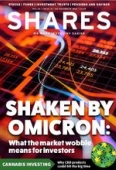Archived article
Please note that tax, investment, pension and ISA rules can change and the information and any views contained in this article may now be inaccurate.
What Omicron means for the markets

The emergence of Omicron, a new Covid variant, has negatively impacted investor sentiment thanks to the possibility of further lockdowns and the associated economic disruption. There are several issues that have the potential to impact stock markets – beyond the simple impact of renewed restrictions.
As we write a warning from Moderna CEO Stéphane Bancel on the effectiveness of existing vaccines against the new variant has helped puncture an initial rebound in the markets.
Omicron has reduced the likelihood of a rise in UK interest rates in December, while simultaneously increasing the possibility that inflationary pressures stay stronger for longer. Finally, a lower interest rate environment may be beneficial for growth stocks and inhibit any potential rotation out of higher rated sectors into more value-orientated stocks.
The other thing to note is the level of uncertainty, with the full impact of Omicron only becoming clear in the coming weeks, in the interim we can expect lots of market volatility.
POTENTIAL CONSUMER SPENDING HIT
Recent figures from the ONS (Office for National Statistics), revealed that the real cost of living rose by 4.2% in October, the highest rate in almost 10 years. As a result markets had been anticipating that interest rates would rise at the next monetary policy meeting on 16 December.
However with the emergence of several cases of the new Omicron variant both in England and Scotland, there are growing fears that new lockdown measures may be necessary to prevent the spread of what is considered to be a more contagious Covid variant.
Consumer activity accounts for approximately 70% of economic activity in the UK so any new measures imposed to prevent the transmission of the new Covid variant would have a large negative impact upon economic growth. This was a key take-away from the series of prior lockdowns.
Given the markets are now pricing in a two in three chance UK base rate will remain on hold in December. A February rate rise is now expected - priced in with an 80% probability. This represents a pretty dramatic turnaround for interest rate markets, which were previously factoring in a rate rise in early November.
INFLATION: STRONGER FOR LONGER
Former German central bank president Karl Otto Pohl compared inflation to toothpaste; once out of the tube, it is difficult to put back. This is particularly the case in the absence of interest rate rises.
A higher level of inflation has some political expediency. Governments on both sides of the Atlantic have incurred abnormally levels of debt due to the furlough schemes introduced during Covid.
Inflation erodes the real value of debt, and therefore whilst politicians will publicly espouse the virtues of a low level of inflation, behind closed doors they will acknowledge that inflation does have a silver lining in reducing high levels of debt without imposing any unpopular policy measures like austerity.
The Bank of England expects inflation to rise further to around 5% in the spring of 2022 before falling back toward its 2% target by late 2023, as the impact of higher oil and gas prices fades and demand for goods moderates.
There are several indications that this view may be over optimistic. The recovery from the pandemic has been accompanied by a surge in both wages and prices.
American hourly pay rose by 4.6% in the year to September, while consumer price inflation of 5.5% has more than eradicated those gains. Excessive wage growth could be the next factor to drive up prices, especially if workers demand higher pay in the expectation of a future rise in the cost of living.
GROWTH STOCKS: BENEFIT FROM LOWER RATES
Growth stocks may benefit from a lower interest rate environment. The market has been concerned that growth stocks trading on lofty earnings multiples may be vulnerable to a correction in the wake of rising interest rates.
This is particularly the case where companies are in the early stages of their development. This often involves companies in the technology sector where they are experiencing rapid rates of growth but are loss making.

Such companies are often valued based on their future cash flows using a discounted cash flow method.
Put simply this assesses the value of their future cash flows compared to the cost of capital – based on borrowing rates and the returns demanded by investors in their shares.
If interest rates rise, so does the associated WACC (weighted average cost of capital), and this can significantly reduce the value of future cash flows and the overall value of the company. If interest rates stay subdued for a longer than anticipated period, these growth-orientated companies will look more attractive from a valuation perspective.

WHAT HAPPENED ON ‘RED FRIDAY’
Global shares were decimated on 26 November as panic selling swept the market on Black Friday, dubbed Red Friday in some quarters as investors faced a sea of red on their screens. Any hopes that the 29 November’s calm and modest bounce might stick were scuppered by 30 November, with markets once again falling sharply.
The UK benchmark FTSE 100 finished Black Friday, 266 points lower, or 3.6% down, at 7,044.03, its biggest one-day decline since the original Covid crash.
Mid caps offered little protection for investors with the FTSE 250 losing nearly 750 points, or 3.2% as it closed at 22,573.89. Anything travel or leisure related bore the brunt of the selling although commodity, energy and bank stocks also sold off.
European markets fell significantly, following the steep sell-off across Asia, with the Euro Stoxx 50 closing 4.7% down at 4,090.44. The ugly mood extended to Wall Street following the US market’s close for the Thanksgiving holiday on 25 November, with the Dow Jones losing 2.5%, while the S&P 500 dropped 2.3% and the tech-fuelled Nasdaq Composite fell 2.2%.
Bitcoin has also taken a bath, plunging to six-week low $53,700 while oil slumped nearly 11%, with Brent crude losing almost $9 a barrel to $73.30.
Investors have always known that new variants could well be a problem, but while reports over the past 12 months of possible candidates that might be a concern have come and gone, Omicron is being treated very differently.
TRAVEL SECTOR SLAMMED
The new rules have seen the UK temporarily ban inbound flights from South Africa, Namibia, Zimbabwe, Botswana, Lesotho and Eswatini but while travel bans and newly mandated mask wearing in shops and public transport may be well-supported by the public in the short-term.

Brits find themselves almost back at square one, with questions again being asked about Christmas in populations that are for the most part double-jabbed, and well on the way to being triple jabbed.
This may help to explain the outsized reaction we saw in the likes of airline shares which got absolutely hammered on Red Friday and will certainly continue to be subject to the ebb and flow of worry, as concerns grow as to what the next two weeks will mean for this beleaguered sector.
Concerns about going down the lockdown route may also explain why governments are going in hard early on, because they fear the consequences of trying to impose another Christmas lockdown. Investors may return to past lockdown winners like Zoom, Peloton and Netflix, whose shares have firmed in recent days, although we will have to see if this trend sticks.
Important information:
These articles are provided by Shares magazine which is published by AJ Bell Media, a part of AJ Bell. Shares is not written by AJ Bell.
Shares is provided for your general information and use and is not a personal recommendation to invest. It is not intended to be relied upon by you in making or not making any investment decisions. The investments referred to in these articles will not be suitable for all investors. If in doubt please seek appropriate independent financial advice.
Investors acting on the information in these articles do so at their own risk and AJ Bell Media and its staff do not accept liability for losses suffered by investors as a result of their investment decisions.

 magazine
magazine








